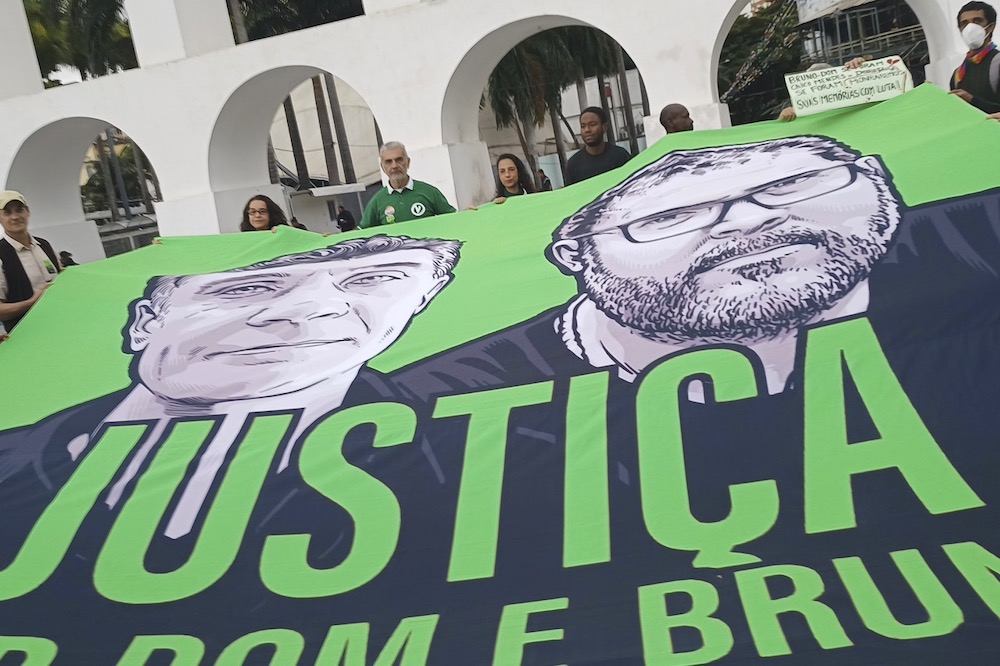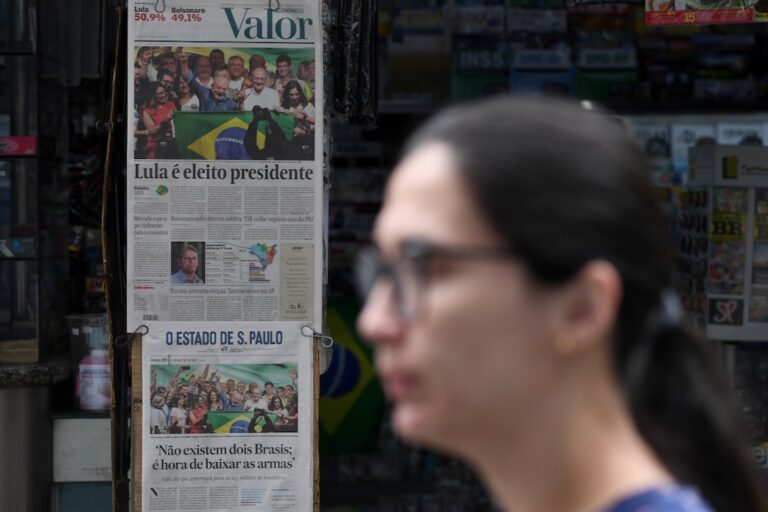The June murders of British journalist Dom Phillips and Indigenous issues expert Bruno Pereira, whom police suspect were killed by people with ties to illegal fishing in the Amazon, amounted to a "nightmare" come true, Brazilian journalist Daniel Camargos, who often covers the Amazon, told CPJ.
This statement was originally published on cpj.org on 26 July 2022.
The June murders of British journalist Dom Phillips and Indigenous issues expert Bruno Pereira, whom police suspect were killed by people with ties to illegal fishing in the Amazon, amounted to a “nightmare” come true, Brazilian journalist Daniel Camargos, who often covers the Amazon, told CPJ in a phone interview.
Camargos, an investigative reporter for news website Repórter Brasil, is one of the country’s journalists deeply familiar with the risks facing people who shine a light on environmental crimes in Brazil. According to environmental group Global Witness, 20 environmental activists were killed in the country in 2020.
The Amazon’s Javari Valley, where Phillips and Bruno were killed, is known as a drug trafficking route where illegal activities like logging, fishing, and mining thrive, posing a threat to local Indigenous communities. President Jair Bolsonaro’s cuts to environmental and Indigenous protection funds have only encouraged the lawlessness, reporters told CPJ.
Globally, the environment is a dangerous topic to cover. Between 2009 and 2019, at least 13 journalists who covered the topic were killed for their work around the world, according to CPJ research cited in “Green Blood,” a reporting project by the Forbidden Stories consortium.
To learn more about how journalists cover and navigate risks in the Amazon, CPJ spoke with Camargos and three other Brazilian journalists who have reported in the region. The interviews have been edited for length and clarity.
Ciro Barros, reporter covering environmental and human rights issues at non-profit investigative journalism news website Agência Pública
What is the potential impact of the killings of Phillips and Pereira on future coverage of the region?
This murder is a benchmark. We are still numb, bewildered. Newsrooms need to think about what happened, because the kind of work that Dom was doing is the work that we do.
We went to Atalaia do Norte [a city in the Amazon’s Javari Valley] in the wake of their disappearance, thinking “What happened to them?” As time passed, the hope of finding them alive waned. It had a huge emotional impact. The day the bodies were found was very difficult. We spent many hours at the pier, waiting for the bodies to arrive.
It was a mix of emotions. While tragedies and difficult stories are hard to deal with, our work becomes more relevant when we are close to those stories. It is a contradiction that we carry in this investigative work.
I don’t know what will change. But that certainty that we used to have, that there was a limit [to the use of violence against journalists], we no longer have it.
A person [in the Javari Valley] told me he was threatened that this [violence against people who point out environmental crimes] “is not going to stop at Bruno.” People know that region will go back to being a place where the state is absent and where criminal groups thrive. It is impossible to imagine that just our work as journalists will create a profound change in Javari Valley. State action is needed [to address environmental crimes].
What does it take to cover the Amazon, a complicated reporting terrain?
Covering the Amazon is enormously logistically complex. Locations that appear to be close in proximity on a map are in reality far away. The roads can be very bad. You must rent a bigger, better car, a 4×4 [four-wheel drive]. There are many places in the Amazon that can only be reached by river, but the boats don’t always come when you expect them to. You must consider whether it is the rainy or dry season because certain areas are completely inaccessible at certain times of the year. There’s the cost of renting a boat and the cost of gasoline — and you must buy gallons of gasoline and store them ahead of time because in many places you can’t buy it.
The communication challenges are enormous. During our recent reporting trip in Atalaia do Norte we had connection difficulties in which we could not send a one megabyte Word document, let alone a photo. We could barely access the internet to check certain information.
There you pay everything in cash, you can’t buy anything with a card.
[ … ]
Daniel Camargos, investigative reporter covering rural conflicts and the environment for investigative journalism and human rights organization Repórter Brasil
Talk about why environmental reporting is so critical in Brazil.
Investigative journalists are able to delve deeper into the themes, look at production chains to identify the companies that violate environmental rights. At Repórter Brasil we do not aim for profit, we want impact, we want to transform reality. We don’t report to win prizes, but to improve the lives of people who are suffering because of environmental crimes. Last year, we discovered that a brewery was going to build a factory next to an archaeological site where the Luzia skull [an archaeologically significant 11,500-year-old skull] was found. This article took a long time to produce but it led the brewery to give up on building the factory there.
[ … ]
Elaíze Farias, journalist and co-founder of Amazônia Real, an independent investigative journalism website based in Manaus, capital of Amazonas state
What is different about Amazônia Real’s coverage of the Amazon?
We are based here in the Amazon itself. We are witnesses and we experience the destruction of the forest. The fact that we are here, reporting, witnessing, and experiencing reality, this brings us closer to certain stories that we portray.
[ … ]
Cícero Pedrosa Neto, multimedia reporter for Amazônia Real covering mining and agrarian conflicts
What would you say to a journalist who wants to cover the Amazon?
I would tell the journalist to strip away any internal prejudice against the Amazon population, not to exoticize it. Be prepared to be in a place where you do not belong, and to respect the symbols, privacy, and pace of life of local populations.
[ … ]



